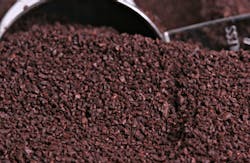Left-over coffee grounds will be used to make biogas in Switzerland as part of a joint project between food group Nestle and renewable energy specialist Groupe E Greenwatt.
The two companies have teamed up to build an agricultural biogas plant in Vaud, Switzerland, to provide renewable energy for the Henniez bottling plant and the Swiss power grid, as well as natural fertilizer for local farms. Nestle's Nespresso brand will contribute about 3,000 tons of coffee grounds from its three production centers and from its Swiss recycling system.
The plant will also process 28,000 tons of manure every year from 27 local farms.
Planned to open at the end of 2015, it will generate enough green electricity to power more than 1,000 homes a year through the Swiss national grid. Meanwhile, heat from the biogas plant will be piped to the nearby Henniez bottling plant, where it will heat water for cleaning.
Used coffee grounds have high energy potential, Nestle said. Across the world, used coffee grounds from Nespresso capsules have found new uses in a wide range of other revalorization projects.
In some countries, including the United Kingdom, Australia and the United Arab Emirates, coffee grounds are used as high-quality natural compost and heating briquettes. In other recycling schemes in Europe, pyrolysis — thermochemical decomposition using heat in the absence of oxygen — is used to transform the residual coffee into energy that helps to power the recycling process itself. And in France, one Nespresso recycling partner is exploring the use of coffee grounds as a natural filter to purify wastewater.
